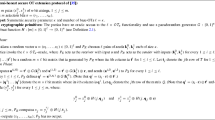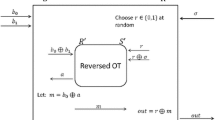Abstract
We provide protocols for the following two-party problem: One party, the sender, has N values and the other party, the receiver, would like to learn k of them, deciding which ones in an adaptive manner (i.e. the ith value may depend on the first i-1 values). The sender does not want the receiver to obtain more than k values. This is a variant of the well known Oblivious Transfer (OT) problem and has applications in protecting privacy in various settings.
We present efficient protocols for the problem that require an O(N) computation in the preprocessing stage and fixed computation (independent of k) for each new value the receiver obtains. The on-line computation involves roughly log N invocations of a 1-out-2 OT protocol. The protocols are based on a new primitive, sum consistent synthesizers.
Research supported by grant no. 356/94 from the Israel Science Foundation administered by the Israeli Academy of Sciences.
Research supported by an Eshkol Fellowship of the Israeli Ministry of Science.
Chapter PDF
Similar content being viewed by others
Keywords
These keywords were added by machine and not by the authors. This process is experimental and the keywords may be updated as the learning algorithm improves.
References
M. Bellare and S. Micali, Non-interactive oblivious transfer and applications, Proc. Advances in Cryptology-Crypto’ 89, Springer-Verlag LNCS 435 (1990), 547–557.
D. Boneh, The Decision Diffe-Hellman Problem, Proc. of the Third Algorithmic Number Theory Symposium, Springer-Verlag LNCS 1423 (1998) 48–63.
G. Brassard, C. Crépeau and J.-M. Robert Information Theoretic Reduction Among Disclosure Problems, 27th Annual Symposium on Foundations of Computer Science, 1986, 168–173.
G. Brassard, C. Crépeau and J.-M. Robert, All-or-Nothing Disclosure of Secrets, Proc. Advances in Cryptology-Crypto’ 86, Springr-Verlag LNCS 263 (1987), 234–238.
C. Cachin, S. Micali and M. Stadler, Computationally Private Information Retrieval With Polylogarithmic Communication, Proc. Advances in Cryptology-Eurocrypt’ 99, Springr-Verlag LNCS 1592 (1999), 402–414.
D. Chaum, E. van Heijst, and B. Pfitzmann, Cryptographically strong undeniable signatures, unconditionally secure for the signer, Proc. Advances in Cryptology-Crypto’ 91.
B. Chor, N. Gilboa, and M. Naor, Private information retrieval by keywords, manuscript, 1998.
B. Chor, O. Goldreich, E. Kushilevitz and M. Sudan, Private Information Retrieval, JACM 45 (1998), 965–981. Preliminary version appeared in Proc. 36th IEEE Symposium on Foundations of Computer Science, 1995.
R. Cramer, I. Damgrd, B. Schoenmakers, Proofs of partial knowledge and simplified design of witness hiding protocols, Proc. Advances in Cryptology-Crypto’ 94, Springr-Verlag LNCS 839 (1994), 174–187.
R. Cramer and V. Shoup, A practical public key cryptosystem provably secure against adaptove chosen ciphertext attacks, Proc. Advances in Cryptology-Crypto’ 98, Springr-Verlag LNCS 1462 (1998), 13–25.
W. Diffe and M. Hellman, New directions in cryptography, IEEE Trans. Inform. Theory, vol. 22(6), 1976, 644–654.
Y. Dodis and S. Micali, Lower bounds for oblivious transfer reductions, Proc. Advances in Cryptology-Eurocrypt’ 99, Springr-Verlag LNCS 1592 (1999), 42–54.
C. Dwork, M. Naor, O. Reingold and L. Stockmeyer, Magic functions, manuscript, 1999.
T. ElGamal, A public key cryptosystem and a signature scheme based on discrete logarithms, Proc. Advances in Cryptology-Crypto’ 84, Springr-Verlag LNCS 196 (1985), 10–18.
M. L. Fredman, J. Komlos and R. Szemeredi, Storing a sparse table with O(1) worst case access time, JACM 31 (1984), 538–544.
S. Even, O. Goldreich and A. Lempel, A Randomized Protocol for Signing Contracts, Communications of the ACM 28, 1985, 637–647.
Y. Gertner, Y. Ishai, E. Kushilevitz, and T. Malkin, Protecting Data Privacy in Private Information Retrieval Schemes, Proc. of the 30th ACMSymp. on the Theory of Computing, 1998.
O. Goldreich, Secure Multi-Party Computation (working draft) Version 1.1, 1998. Available at http://philby.ucsd.edu/books.html
R. Impagliazzo and S. Rudich, Limits on the Provable Consequences of One-Way Permutations, Proc. of the 20th ACM Symp. on the Theory of Computing, 1988.
E. Kushilevitz and R. Ostrovsky, Replication Is Not Needed: Single Database, Computationally-Private Information Retrieval, Proc. 38th IEEE Symp. on Foundations of Computer Science, 1997
A. J. Menezes, P. C. van Oorschot and S. A. Vanstone, Handbook of Applied Cryptography, CRC Press, 1996.
M. Naor, Bit Commitment Using Pseudo-Randomness, Journal of Cryptology, vol. 4, 1991, 151–158.
M. Naor and B. Pinkas, Oblivious Transfer and Polynomial Evaluation, Proc. 31th ACM Symp. on Theory of Computing, 1999, 245–254.
M. Naor and O. Reingold, Synthesizers and their application to the parallel construction of pseudo-random functions, Proc. 36th IEEE Symp. on Foundations of Computer Science, 1995, 170–181.
M. Naor and O. Reingold, Number-Theoretic constructions of efficient pseudorandom functions, Proc. 38th IEEE Symp. on Foundations of Computer Science, 1997, 458–467.
M. O. Rabin, How to exchange secrets by oblivious transfer, Tech. Memo TR-81, Aiken Computation Laboratory, 1981.
M. Stadler, Publicly verifiable secret sharing, Proc. Advances in Cryptology-Eurocrypt’ 96, Springr-Verlag LNCS 1070 (1996), 190–199.
S. Wiesner, Conjugate coding, SIGACT News 15, 1983, 78–88.
Author information
Authors and Affiliations
Editor information
Editors and Affiliations
Rights and permissions
Copyright information
© 1999 Springer-Verlag Berlin Heidelberg
About this paper
Cite this paper
Naor, M., Pinkas, B. (1999). Oblivious Transfer with Adaptive Queries. In: Wiener, M. (eds) Advances in Cryptology — CRYPTO’ 99. CRYPTO 1999. Lecture Notes in Computer Science, vol 1666. Springer, Berlin, Heidelberg. https://doi.org/10.1007/3-540-48405-1_36
Download citation
DOI: https://doi.org/10.1007/3-540-48405-1_36
Published:
Publisher Name: Springer, Berlin, Heidelberg
Print ISBN: 978-3-540-66347-8
Online ISBN: 978-3-540-48405-9
eBook Packages: Springer Book Archive


